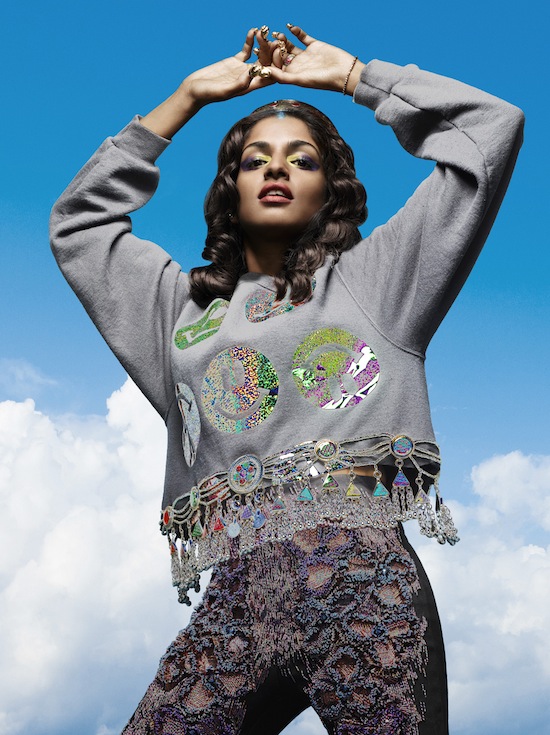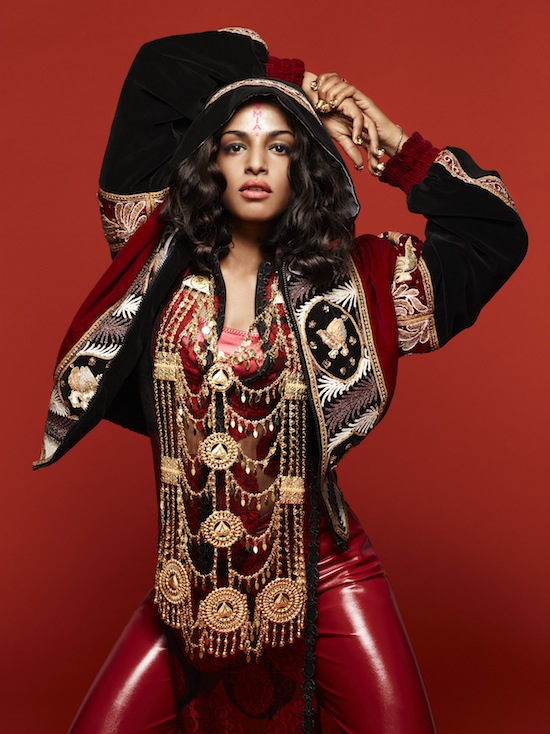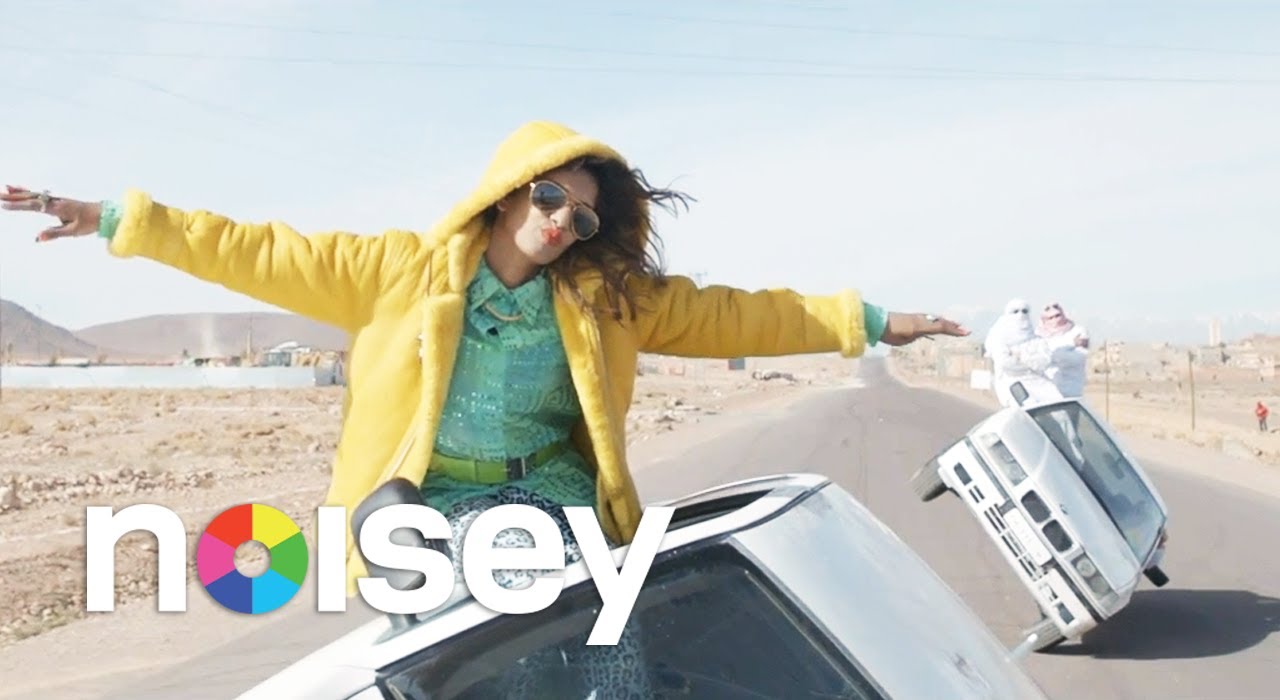When M.I.A. released her fourth album, Matangi, in November 2013, no one was more surprised than the 38 year-old musician (and visual artist) herself. Though she had released the Grammy-nominated single and video ‘Bad Girls’, still unaccompanied by an album, she had no plans to make an album at all. But she found that her musical odyssey had not yet been fully charted and so released Matangi to positive critical reviews but an overall poor showing in sales. Perhaps the lacklustre figures were due, in part, to record label complications – Innerscope changed the release date so much that M.I.A. threatened to leak the album herself. Now, with the album out, that chapter closed and festival headline slots in the works, it’s time to find out what’s next.
What is the current role of record labels, and how is it changing, based on what you’ve gone through with making and distributing your new record?
M.I.A.: I don’t really see a difference in independent and major labels. To me, it’s pretty much the same. There used to be a difference between indies and major labels, but I don’t think there is anymore. Now it’s more like, "What kind of music do you put out?" and "What kind of sentiment do you promote?" You get backed or promoted and it’ll be on the top of every blog as long as it fits the criteria. My thing is that I think it’s because I was moving from XL onto Roc Nation, they weren’t used to the process and the way I work. It was a bit 50/50 because I was figuring out a way to make this record based on what I was going through rather than make this record because I was in the habit of making them, because that was my lifestyle.
How was making the mixtape different from making records?
M.I.A.: It’s way faster when I don’t have to explain myself to people or to get approval from people whether it’s ok and whether it’s good or not, you just make something to put out. I think a combination of making the mixtape and coming across the Matangi concept – music can be separate from the label. And then there’s a bit of hope that a song can be about anything. If you want to write a song about anything, you can, and you don’t have to put it through the process of having it be trendy or cool or generic pop or these types. You don’t have to go by that. So that was kind of cool. But to make the ‘Bad Girls’ video, which came from the mixtape, I’d already sort of committed to figuring out the album that ‘Bad Girls’ would fit into. It was kind of interesting because I was making this album, but when I wrote ‘Bad Girls’ it was in the past. I wanted it to be a proper album, like the aftermath of that song is you die and you reincarnate. ‘Bad Girls’ was kind of the ending of that, the MAYA record and VickiLeekx, so it was sort of like killing off this thing and then doing the next process and then Matangi sort of happened, actually. It was important to do that as record with the label because it tied up all the other records. I didn’t want to make another mixtape.
What was the spiritual process of making this album like?
M.I.A.: I wasn’t planning to make this record. I just thought it ended with MAYA and I didn’t really anticipate there being an aftermath, and at the time I made the ‘Bad Girls’ video. It was the first time a video was nominated for a Grammy that didn’t have an album attached to it and so I feel like I wasn’t really anticipating it but then it happened. It’s nice to sort of go back to the beginning, like to my original name.
Do you feel like the story has ended or is there more unfolding?
M.I.A.: I’m not sure. Every time I think it’s the last one.
I was reading an interview you did with Pitchfork a while back, and you were talking about your art and said you didn’t like street art. I was curious to hear you say more about that.
M.I.A.: I think the context of street art has changed. You can kind of see that with Banksy who’s still trying to deal with those questions. I think it has changed, and it’s sort of become a genre. I think when something becomes a comfortable genre, it’s against what street art stood for in the beginning – breaking out of genres and taking art out of galleries. Now street art is in the gallery, and it’s all made up into a nice, packaged concept.
How would you like to see art disseminated?
M.I.A.: I don’t know. It’s this thing where if you deal with subject matter that isn’t really Western, you have go to through some sort of a process before it gets put in a gallery here, and people become more afraid. I feel like the lines have closed in terms of international, global artists being appreciated and part of the art community. I would like to see more of that, to have more of an international art community and have it be less segregated because it doesn’t suit what art as a concept stands for. Art is supposed to be about creativity. But the same people are the same art darlings every month, and it’s a bit annoying. It’s supposed to be diverse and interesting and conceptual and have weird concepts in a comfortable place.

You sent us a list of 13 albums that were influential for you. I won’t go through all of them, but did want to touch on some themes. You had several mid 90s hip hop albums there, and I wondered if you thought contemporary hip hop was missing anything compared to the hip hop albums of that period.
M.I.A.: I think people were genuinely addicted to hip hop in the 90s, addicted to the idea of empowerment. I think it came from [the fact that] the rappers in the 90s, their parents coming from the 70s, had such a rich variety of records to sample. Those kind of records, the music that was made in the 60s and 70s did come from a really soulful place. The seed for the songs written in the 90s were planted in those songs, even though they were samples. They were tied up around huge ideas of liberation and revolution and civil rights and all these things that the parents of these rappers were experiencing at the time.
But by the time it came to the 90s, the late 90s, being a businessman was the beacon to uphold. We’ve been having the concept of the best rapper equals the best businessman for ten years now, so the kids that are coming up now are the ones that have listened to that. Of course there’s going to be information lost in that because businessmen in society are not going to be the ones that promote anything outside of money. So if you narrow the playing field, the next generation has less to put out, to eat and regenerate from. There has been an effect of business rap on the output of today’s rap music. But I don’t think that’s the modern day rapper’s fault. We did that. We started putting that as a priority and the industry changed the requirements of what an artist is. The consequence of making it a business thing and making an artist the same as a Wall Street trader is that you do get a robot by the end of it. It becomes more robotic as opposed to being more soulful.



